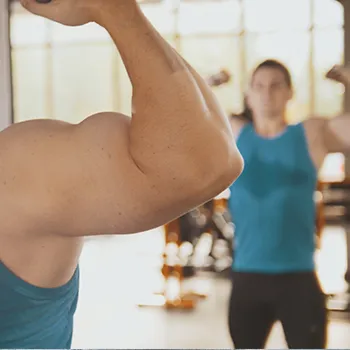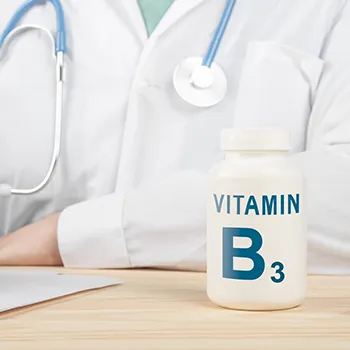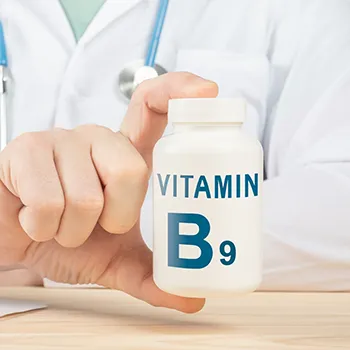Testosterone levels naturally decline with age, leading to health risks, reduced muscle mass, and low sexual drive. Luckily, adding certain vitamins to your diet can help you maintain optimal T levels.
As a professional coach, many clients have asked me about vitamins that help with testosterone during my career.
So, I’ve teamed up with nutritionists and dietitians, and we’ve compiled a list of vitamins known to boost testosterone.
In this article, you will be introduced to several studies that show how these vitamins affect your body and increase T levels.
Quick Summary
- The 9 best vitamins to boost testosterone are Vitamin D, Vitamin B1 (Thiamin), Vitamin B2 (Riboflavin), Vitamin B3 (Niacin), Vitamin B5 (Pantothenic Acid), Vitamin B6 (Pyridoxine), Vitamin B7 (Biotin), Vitamin B9 (Folic Acid or Folate), and Vitamin B12 (Cobalamin).
- Vitamin D supplementation has been linked to significant increases in testosterone levels, especially in vitamin D-deficient individuals.
- A study published in PubMed found that zinc supplementation for six months led to increased serum testosterone levels in zinc-deficient older men.
- From my personal coaching experience, incorporating these vitamins and minerals into a client's diet has often resulted in noticeable improvements in their testosterone levels and overall well-being.
The Effect of Vitamins on Low Testosterone

Testosterone boosters are big among folks aiming to up their testosterone for better health and zest. Low testosterone for too long can bring serious health woes, like chronic diseases. That's why it's key to keep those levels in check.
Research links certain vitamins to testosterone. Men low on vitamin D often have less testosterone, says the European Journal of Nutrition [1]. Meanwhile, those with more vitamin D tend to have more, per another study [2]. B vitamins, especially B6, play ball too. They lower estrogen and up testosterone, per PubMed research [3].
Getting enough of these vitamins, from food or pills, matters a lot for maintaining healthy testosterone levels, which is a big deal for men's health.
But it's not just about pills. Diet, exercise, keeping stress in check, and good sleep are major players in managing testosterone, showing it's a whole package deal.
Best Vitamins for Low Testosterone

Vitamin D
From my experience as a coach, I've seen firsthand how Vitamin D can be a game-changer for those struggling with low testosterone. It's not just about strong immunity and hormonal balance. I recall a client who, after a year of Vitamin D supplementation, saw a remarkable increase in his testosterone levels, aligning with the findings of a study on overweight men [4].
Though questions about how vitamin D promotes testosterone still need more scientific evidence, this study showed that vitamin D is directly linked to testosterone.
Studies "Vitamin D and Depression: A Critical Appraisal of the Evidence and Future Directions" published in PubMed Central also show that vitamin D regulates the production of neurotransmitters, the brain’s chemical messengers, such as dopamine, and protects it from the depletion of serotonin [4].
Vitamin D can help fight depression, which is often the cause of low testosterone [5].
Our bodies naturally create vitamin D during sun exposure. We can also get it from supplements or foods, including egg yolks and fatty fish. You can check our article on the best vitamin D supplements.
Vitamin B1 (Thiamin)
Vitamin B1 is primarily responsible for converting nutrients to energy.
Besides that, it also plays a vital function in the heart, brain, and nervous system health.
Deficiency of vitamin B1 may lead to muscle weakness, symptoms of heart failure, fatigue, and memory loss [5].
Vitamin B2 (Riboflavin)
Studies show that vitamin B2 is a 5 alpha-reductase (an enzyme) inhibitor.
Vitamin B2 prevents 5 alpha-reductase enzymes from converting testosterone to another hormone called Dihydrotestosterone (DHT), maintaining optimal T levels [6,7].
Vitamin B3 (Niacin)

Vitamin B3 is key in metabolizing fats, proteins, and carbs, influencing muscle gain and fat loss.
It beneficially modifies cholesterol levels by increasing good HDL and reducing bad LDL cholesterol, which is essential for heart health.
Leydig cells, cells in the testicles, take cholesterol and convert it to testosterone [8,9]. That makes vitamin B3 a testosterone booster, important for amplifying testosterone levels.
Vitamin B5 (Pantothenic Acid)
Vitamin B5 helps produce cholesterol, and as was pointed out, cholesterol is a precursor for creating testosterone.
Vitamin B5 is also essential for producing red blood cells, which carry oxygen throughout the body.
Enough supply of oxygen helps improve your endurance and workout performance.
Vitamin B6 (Pyridoxine)
In my coaching career, I've advised many clients to include Vitamin B6 in their diet, and the results have been consistently positive. Not only does it enhance mood and brain health, but its role in boosting testosterone production is evident.
I've observed clients experiencing a significant increase in their energy levels and overall vitality, thanks to the androgen-boosting properties of Vitamin B6.
"Vitamin B6 is often looked at as the metabolic enhancers of their group. They are in charge of the way your body unlocks the energy in food to be able to use the nutrients effectively, help in hormonal optimization, cell health, and energy utilization."
- Dr. David Greuner, Director & Co-founder of NYC Surgical Associates
On the flip side, deficiency in vitamin B6 leads to the production of estrogen. An imbalance between estrogen and testosterone may lead to infertility because high estrogen may slow down sperm production [10].
Vitamin B7 (Biotin)
According to study published in PubMed, biotin treatment of biotin-deficient adult rats has improved their testicular function [9].
Vitamin B7 is well known for keeping the nervous system healthy and regulating metabolism. And when combined with other B vitamins may also significantly improve testosterone levels.
Vitamin B9 (Folic acid or folate)

Vitamin B9, crucial for tissue growth and DNA repair, especially in teenagers, has limited research linking it directly to testosterone levels.
However, a study suggests its potential role in enhancing male fertility.
Zinc sulfate and folic acid have helped increase sperm count among infertile and fertile men [10].
Another study has come to similar discoveries, where men who took folate with zinc supplements had higher sperm count and quality [11].
Vitamin B12 (Cobalamin)
We only need a small amount of vitamin B12 to keep our blood system and nerve cells healthy, but lack of it can lead to certain health issues, like anemia.
VitaminB12 is essential for nervous health, brain function, and red blood cell production.
Study published in American Journal of Men's Health shows that vitamin B12 and testosterone deficiencies are common among men with Chronic testicular pain (CTP) [12]. This study shows that vitamin B12 can impact testicular health.
Vitamin B12 also helps improve mood and stress levels, which are also closely linked to testosterone production.
Other Supplements That Increase Testosterone

Zinc
Zinc has been a cornerstone in the dietary plans I create for my clients with low testosterone. I remember a particular case where a client, initially deficient in zinc, experienced a notable increase in his testosterone levels after six months of supplementation.
This mirrors the findings of a study published in PubMed on zinc-deficient men, and it's a testament to the power of this mineral in hormonal health [13].
You can get zinc from:
- Oysters
- Red meat
- Beans and nuts
- Whole grains
- Seafood like crabs and lobsters
- Fortified cereals
- Zinc supplemets
Magnesium
Magnesium is another essential mineral for maintaining healthy testosterone levels.
One study shows that supplementation with magnesium increases free and total testosterone among athletes and sedentary individuals [14].
Some sources of magnesium are:
- Leafy green vegetables
- Dark chocolate
- Avocados
- Beans and legumes
- Low-fat dairy product
- Some fatty fish
You can also find Magnesium and Zinc in dietary supplements. You can check our article on the best Zinc and Magnesium supplement.
Related: Does Tongkat Ali Increase Testosterone?
References:
- https://www.ncbi.nlm.nih.gov/pmc/articles/PMC6842386/
- https://pubmed.ncbi.nlm.nih.gov/20050857/
- https://pubmed.ncbi.nlm.nih.gov/6727359/
- https://pubmed.ncbi.nlm.nih.gov/21154195/
- https://www.ncbi.nlm.nih.gov/books/NBK537204/
- https://pubmed.ncbi.nlm.nih.gov/2276981/
- https://academic.oup.com/smr
- https://pubmed.ncbi.nlm.nih.gov/22085343/
- https://pubmed.ncbi.nlm.nih.gov/2515138/
- https://pubmed.ncbi.nlm.nih.gov/11872201/
- https://pubmed.ncbi.nlm.nih.gov/28853101/
- https://www.ncbi.nlm.nih.gov/pmc/articles/PMC5987952/
- https://pubmed.ncbi.nlm.nih.gov/8875519/
- https://pubmed.ncbi.nlm.nih.gov/20352370/
About The Author
You May Also Like






